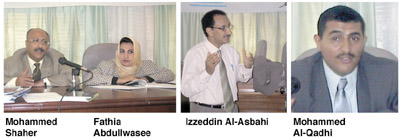
YT Female Journalists’ Training Workshop Concluded [Archives:2001/38/Reportage]
September 17 2001
Yemen Times staff
Organized by the Yemen Times and financed by UNESCO, the four-day training workshop for 22 Yemeni Female Journalists was concluded last Thursday. The event was meant to promote awareness of female journalists to the multidimensional issues of the press and its role in the development drive of the country. The course also aimed at improving the performance of female journalists in all aspects of journalistic writing as well as other issues such as human rights, democracy and their relationship with journalism. The event’s activities included lectures and networking group discussions, as well as practical exercises.
The event was inaugurated by the Ministry of Information represented by Mr. Mohammed Shaher, Deputy Information Minister who attended some of the activities of the event and confirmed the role of the press in dealing with social issues. Ms. Nadia Al-Saqqaf, a YT journalist and workshop coordinator said that the event was carried out to improve the competence of female journalists, as most of the reports prepared by female journalists and published in our newspapers are not efficient and are of poor quality.
She added that another workshop on legal education for journalists would be conducted by Yemen Times in the future. Nadia also gave a lecture on the means of simplifying scientific materials in press reports and articles.
On his part, Walid Al-Saqqaf, Yemen Times editor, said during the opening of the event that the objective of this initiative by Yemen Times is to make woman journalists aware of the techniques and principles of journalism. On the second day of the event, he also delivered a scientific and technical lecture on intelligent internet systems and their usefulness for people working in the press.
Mr. Mahboob Ali, Chairman of the Yemeni Journalists Syndicate (YJS) presented a lecture on female journalism in Yemen throughout history. He said the current situation of female journalists is affected by the social and cultural backwardness of the country, adding that women journalists took over a leading position in the south before unification. However, they represent now only 15% of the total number of journalists. Only 58% of them have membership of the syndicate.

He said women should not beg for a place in the press community. Rather, they should fight for their rights and promote their role as journalists. In this era of democracy, their role becomes very instrumental, asking the people concerned to support women to have their proper position in society. He promised that the syndicate would support women journalists very strongly.
Fathia Abdullwasee, General Manager of the Legal Affairs Department at the Ministry of Information, highlighted the relationship between the Ministry of Information and the press. She said that the Yemeni government has been promoting press freedom and human rights issues, as well as passing laws that protect this freedom and ensure more rights for journalists.
Mr. Izzeddin Saeed Al-Asbahi, Chairman of the Human Rights Information and Training Center (HRITC) presented a lecture on the role of female journalists in promoting human rights. He said there was a very strong bond between the media and human rights, and this bond and the awareness of the fact that media and human rights are complementary to each other are absent in the case of Yemen. He called for the establishment of a powerful NGO that defends the rights of the press, which are a part of human rights in general. The appearance of such NGOs needs great support form the media. Mr. Izzeddin said that support from the media can be instrumental in facilitating NGOs to raise public awareness on human rights issues. Unfortunately, this sort of media is still monopolized by the state, which still deals with NGOs with suspicion and considers them as spies or agents. He also highlighted the legal constraints that NGOs and media face as well as the position of women in media. He said women in Yemen are taking up lead positions in both governmental and non-governmental media posts, and that there are several social and cultural constraints faced by women particularly those working in the media. He concluded that if operating and strong NGOs exist, real protection of press freedom can be available. Similarly, if these NGOs work hard to consolidate human rights issues in society, we can insure women’s rights in their participation in all walks of life, including the media.
Mohammed Hatem Al-Qadhi, Yemen Times Senior Editor and correspondent of the Saudi-based Riyadh Daily, lectured on the fundamentals of investigative journalism and its role in a democracy, in addition to the situation of investigative reporting in Yemen. Al-Qadhi said that investigative journalism is the most important genre of the press required by democracy. It is only through investigative reporting that regimes can be held accountable.
Investigative journalists monitor the institutions of society and can disclose stories about crimes and abuses of decision-makers at the center of power. Such stories which disclose corruption, injustice and other negative phenomena keep people well-informed and enable them to make the right decisions.
According to Al-Qadhi, investigative journalism is highly needed by democratic societies. “Unfortunately, strong and honest newspapers that bring all those negative issues and disclose them to the public in Yemen are still very weak for many reasons,” Al-Qadhi stressed.
He concluded that Yemen press institutions must sponsor and encourage investigative journalism that can disclose corrupt individuals and hold them accountable for their actions. He also urged women journalists to join in such kinds of reporting.
At the end of the workshop on September 13th, the Editor-in-Chief of the Yemen Times, Mr. Walid Al-Saqqaf, presented certificates to the participants who completed the course positively. A certificate of appreciation was handed over to Ikram Al-Akori from Saba News Agency for writing the best investigative story and another was presented to Mr. Izzeddin Al-Asbahi for his thorough support for the workshop and for the free press.
——
[archive-e:38-v:2001-y:2001-d:2001-09-17-p:./2001/iss38/report.htm]


